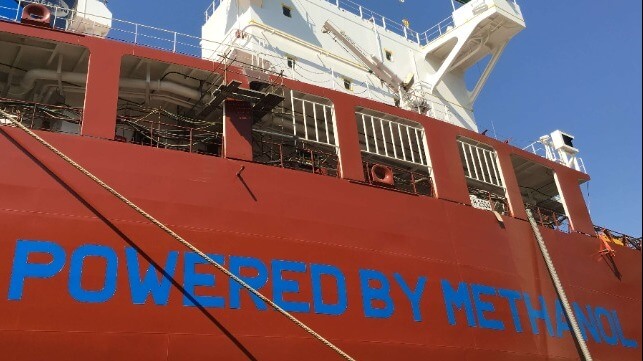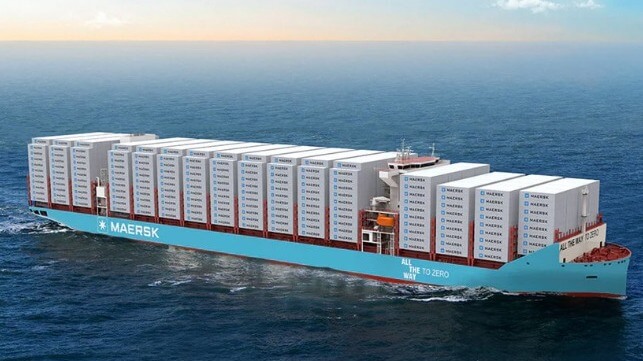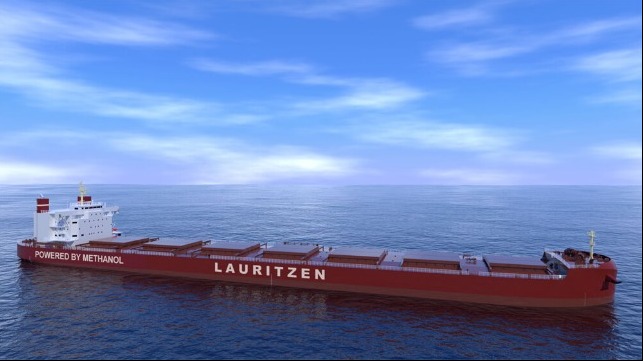New Crew Training Package Supports Adoption of Methanol as Marine Fuel

[By: The Methanol Institute]
The Methanol Institute has welcomed multi-disciplinary methanol consultancy GREEN MARINE as its latest member.
The Denmark-headquartered company has recently finalised a specialist training programme for crews onboard Methanol dual-fuel vessels, supplementing baseline regulatory training requirements with practical, experience-based learning.
The scale of the crew training challenge presented by the fuels required for decarbonisation is at least as great as the technology hurdles the industry faces. A recent report commissioned by the Maritime Just Transition Task Force Secretariat predicts a rise in the number of seafarers needing training on alternative fuel technologies in the 2040s to between 310,000 and 750,000 people.
GREEN MARINE’s Asia team is participating in the development of rules and standards for Methanol bunkering in Singapore, including taking part in a panel of experts to establish policy and training. Stakeholders include local regulators and academics, industry associations and classification societies, in addition to bunker operators.
The crew training programme was created based on practical knowledge gathered over a decade of experience working on Methanol dual fuel vessels with services from design consultancy to newbuilding construction supervision, technical management and operations.
The curriculum, which can be delivered onboard, in a classroom or online, was developed to address the knowledge gaps between theoretical regulation and practical experience in the use of Methanol as marine fuel. GREEN MARINE is able to supplement regulatory baselines with real life experiences based on operational experience, emergency troubleshooting and the application of historical data.
“GREEN MARINE’s team members have played a significant role in the evolution of Methanol as a marine fuel - and in particular bunkering and onboard handling - since its earliest days,” said MI CEO Gregory Dolan. “We are very happy to have GREEN MARINE as a member and we look forward to working together in future to share its operational expertise and practical knowledge as the industry continues its transition to cleaner operations.”
“Our methanol specialists are captains and chief engineers with first-hand knowledge of working with Methanol as a fuel and how to ensure these dual fuel ships operate safely,” said Morten Jacobsen, CEO of GREEN MARINE. “Theoretical knowledge is little use in real life situations when you need to know what to do; we bridge that gap and provide practical knowledge to support crews in adopting this methanol dual fuel technology.”
For more information, please visit www.methanol.org.
The products and services herein described in this press release are not endorsed by The Maritime Executive.
Maersk Orders Six More Methanol-Fueled Ships in Commitment to Net-Zero

Maersk is continuing with its commitment to the principle of only ordering newbuild vessels that can sail on green fuel consistent with its commitments to be net-zero by 2040. The company led the container shipping industry in 2021 with the first orders for dual-fuel methanol vessels and highlights the rapid growth in the orderbook for methanol-ready ships.
A.P. Moller - Maersk and China’s private shipyard Yangzijiang Shipbuilding Group confirmed the order of six dual-fuel methanol-ready containerships. Maersk is calling the vessels “mid-sized” as they will have a capacity of 9,000 TEU. The rendering shows a conventional design with two islands, unlike the new design for the company's larger methanol-fueled containerships.
“For these six container vessels, we have chosen a design and vessel size which make them very flexible from a deployment point of view. This will allow these vessels to fill many functions in both our current and our future network, thereby offering the flexibility our customers demand. Once phased in, they will replace existing capacity in our fleet,” says Rabab Boulos, Chief Infrastructure Officer at Maersk.
Yangzijiang reports the vessels will be domestically designed and built as the group’s entry into methanol-fueled vessels. Maersk reports the engines will be dual-fuel capable of operating on green methanol and will be delivered in 2026 and 2027. As with the pending order for the 24 methanol containerships being built in South Korea, Maersk reports these vessels will also replace existing capacity in the Maersk fleet as part of the planned energy transition.
“With this order, we take another step in the green transformation of our fleet and towards our target of becoming net-zero in 2040,” said Boulos. He highlights that these replacement vessels will have the ability to reduce the company’s greenhouse gas emissions by 450,000 tons of CO2 per year when operating on green methanol.
Maersk will launch the methanol-fueled containership era later this summer with the delivery of its first vessel from South Korea. The 2,100 TEU feeder vessel is scheduled to make the more than 11,000 nautical mile delivery voyage to Copenhagen fueled entirely on green methanol. It will then enter service in the Baltic both as a demonstration ship and a learning experience for Maersk in the operation of methanol-fueled vessels.
The Danish shipping company also has the first of its twelve 16,000 TEU ships containerships under construction expecting them to enter service starting in 2024. They followed that with an additional order for six 17,000 TEU dual-fuel ships. Maersk highlights it now has 25 containerships on order capable of operating on the green methanol out of a fleet that Alphaliner reports consist of 338 owned ships in service and a total of over 680 vessels. The company also announced a trial to convert the first in-service vessel to Methanol in a project with MAN. The contract calls for retrofits of the main engines for a total of 11 vessels.
Maersk continues to follow a different strategy than many of its piers. It is ordering smaller capacity vessels and so far exclusively with methanol. CMA CGM and MSC as well as others are looking to test the waters with methanol while investing in LNG-fueled vessels. It had been rumored that CMA CGM was pointed to place a large methanol-fueled vessel order but Yangzijiang Shipbuilding is reporting it just received an order for 10 LNG fueled 24,000 TEU vessels which are being linked to CMA CGM instead.
The methanol orderbook has grown rapidly in the past two years. DNV sets it at over 100 ships due for delivery by 2028. That includes 81 methanol-capable containerships on order.
For Yangzijiang the order continues a strong stream of contracts this year. So far in 2023, the yard reports a total of 69 vessels ordered worth $5.6 billion. They highlight that after six months they have already exceeded their 2023 order target of $3 billion. The yard says it has its largest-ever backlog with a total of 180 vessels ordered with a value of $14.6 billion.
Cargill and Lauritzen Order Another Pioneering Methanol-Fueled Bulker

Cargill, the leading agribusiness, is accelerating its efforts to improve its shipping operations with an agreement to charter a third methanol-fueled Kamsarmax bulk carrier in a partnership with Danish shipping giant J. Lauritzen. The construction order adds to two vessels ordered two months ago and is in addition to Cargill’s efforts at exploring wind-assisted propulsion for its fleet.
J. Lauritzen reports through its Lauritzen NexGen Shipping division it has placed a third construction order with Japan’s Tsuneishi Group Shipbuilding. They did not announce a delivery date but said the vessel will operate for at least seven years for Cargill.
The vessel will be an 81,200 dwt Kamsarmax bulk carrier. The vessel will be powered by dual-fuel engines capable of using green methanol as well as biodiesel. According to Lauritzen, the vessels will be capable of trading with zero carbon emissions.
While the overall orderbook for methanol-fueled or ready ships is growing rapidly, the bulker segment has lagged with the orders. DNV calculates that there are currently 101 orders for methanol vessels. They report that 81 of the vessels on order will be containerships while only three of the current orders are for bulkers able to run on methanol.
In April, Lauritzen reported it had signed a letter of intent for the construction of a minimum of two methanol dual-fuel 81,200 dwt Kamsarmax bulk carriers to be built by Tsuneishi Shipbuilding. The builder reported that both ships are scheduled to be delivered in the latter half of 2026.
Tsuneishi highlights that the newly developed Kamsarmax design will maintain the high versatility of the class while leading in the new technologies. By loading an independent large-capacity methanol fuel tank, the builder said it has ensured that the methanol-fueled bulk carrier has ample cruising distance to satisfy customer needs. They reported that the hull design is improved versus the conventional Kamsarmax design, for which they have already built over 350 ships. The methanol fuel tank is placed on the stern to maintain the large cargo hold capacity typical of the class while also ensuring the safety and ease of cargo handling and safe and efficient maintenance by the crew.
The shipyard at the end of March 2023 reported it had reached a basic agreement on an order for the world’s first methanol-fueled bulk carrier. That vessel will be owned by Mitsui & Co. and also operate for Cargill. They expect it to enter service in 2025.
In addition to the first methanol-fueled bulkers, Cargill has placed orders for bulkers outfitted for wind-assisted propulsion due to enter service this year. The company also increased its use of biofuels reporting to S&P that it had purchased more than 30,000 metric tons over the past two years while predicting it would reach 50,000 metric tons this year. Between 2017 and the end of 2022, Cargill reports it has cut nearly 1.5 million tonnes of gross carbon emissions from its fleet.
No comments:
Post a Comment